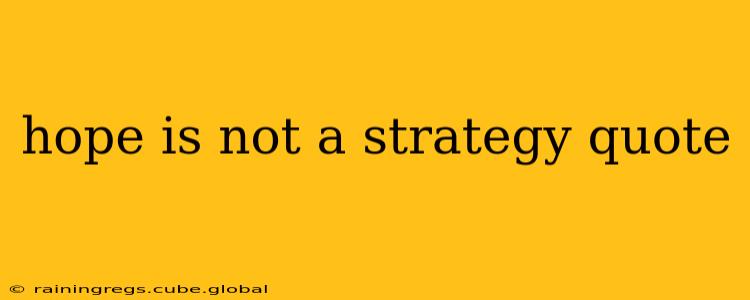The adage "hope is not a strategy" has become a popular refrain in business, project management, and even personal life. But what does it really mean, and why is it so crucial to understand this principle? Simply put, relying on hope to achieve goals is a recipe for disappointment. Success requires a well-defined plan, clear objectives, and actionable steps – not just a positive outlook.
This article will delve deeper into this powerful statement, examining its implications and providing practical strategies for replacing hope with effective planning. We'll also address some frequently asked questions surrounding this concept.
What Does "Hope Is Not a Strategy" Actually Mean?
This statement highlights the critical difference between wishing for a positive outcome and actively working towards it. Hope is a feeling, an emotion. A strategy, on the other hand, is a carefully planned series of actions designed to achieve a specific goal. Hoping your project will succeed without a robust plan is naive; it ignores the potential obstacles and the necessary steps required for success. A strategy, however, acknowledges challenges and provides a roadmap to navigate them.
Is Hope Entirely Useless?
No, hope isn't entirely useless. Hope can provide motivation and resilience, especially during challenging times. It can fuel your determination to persevere and find solutions. However, hope alone is insufficient. It needs to be coupled with a concrete strategy to translate wishful thinking into tangible results. Think of hope as the fuel, and strategy as the engine. You need both to reach your destination.
How Can I Replace Hope with a Strong Strategy?
Replacing hope with a strong strategy involves a multi-step process:
-
Define Clear Objectives: What exactly are you trying to achieve? Be specific and measurable. Instead of hoping for "success," define success in concrete terms (e.g., "increase sales by 20% in the next quarter").
-
Identify Potential Challenges: What obstacles might you encounter? Anticipating potential problems allows you to develop contingency plans and proactively address challenges before they derail your progress.
-
Develop Actionable Steps: Break down your overall goal into smaller, manageable tasks. Each step should be clearly defined and assigned responsibility.
-
Set Realistic Deadlines: Establish timelines for completing each task. This provides structure and accountability, keeping you on track towards your goal.
-
Regularly Monitor Progress: Track your progress and make necessary adjustments along the way. Regular monitoring allows you to identify issues early and make corrective actions before they become major problems.
-
Seek Feedback and Adapt: Be open to feedback and willing to adjust your strategy as needed. Flexibility is key to navigating unexpected challenges and maximizing your chances of success.
What Are Some Examples of Hope vs. Strategy in Action?
Hope: Hoping to lose weight without changing your diet or exercise routine.
Strategy: Developing a personalized weight-loss plan that includes a healthy diet, regular exercise, and tracking your progress.
Hope: Hoping your business will thrive without a marketing plan.
Strategy: Creating a comprehensive marketing strategy that includes target audience identification, market research, and a defined marketing plan with specific tactics.
Hope: Hoping to finish a major project on time without a detailed project plan.
Strategy: Creating a detailed project plan with timelines, tasks, and assigned responsibilities, incorporating regular progress reviews and risk management strategies.
How Can I Develop a More Strategic Mindset?
Developing a strategic mindset involves cultivating several key skills:
- Critical Thinking: Analyze situations objectively, identify underlying issues, and consider various solutions.
- Problem-Solving: Develop the ability to identify and solve problems effectively and efficiently.
- Planning and Organization: Learn to organize your thoughts, prioritize tasks, and manage your time effectively.
- Adaptability: Be flexible and willing to adjust your plans as needed based on new information or changing circumstances.
In conclusion, while hope can be a powerful motivator, it's not a substitute for a well-defined strategy. By replacing wishful thinking with proactive planning, you significantly increase your chances of achieving your goals, whether in your personal life or professional endeavors. Remember, success isn't just about hoping for the best; it's about planning for it.
